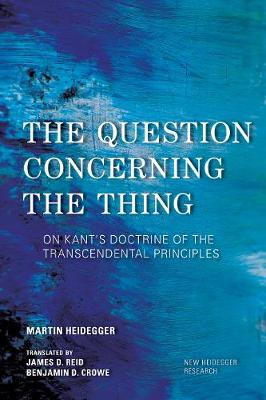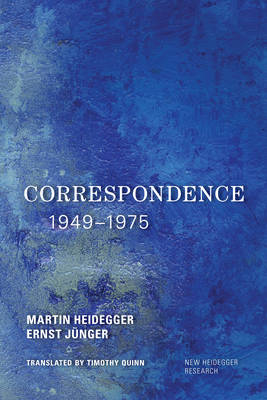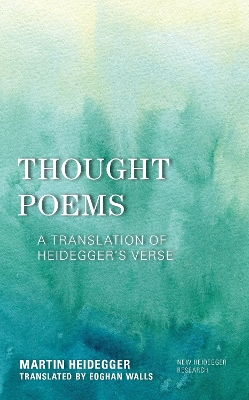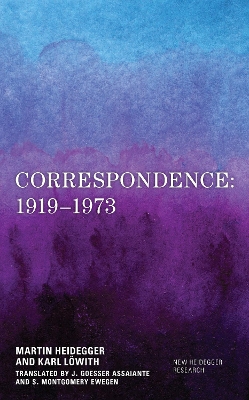New Heidegger Research
4 total works
The Question Concerning the Thing presents a full English translation of a lecture course first delivered by Heidegger at Freiburg University during the Winter Semester of 1935-36 (originally published in German as volume 41 of the Gesamtausgabe).
The text presents with particular clarity Heidegger's distinctive approach to issues of general philosophical interest. Heidegger shows how a litany of classical metaphysical problems flow from the basic question 'what is a thing?', revealing the historicity of these problems and, thus, the ways in which they implicate further issues of cultural significance. He examines issues regarding the history and philosophy of science, philosophy of language, and logic that are still debated today. Moreover, the lecture course as a whole is framed by questions regarding the nature of philosophy itself. Along the way, Heidegger provides sensitive and often provocative discussions of historically significant figures, in particular Kant.
The text presents with particular clarity Heidegger's distinctive approach to issues of general philosophical interest. Heidegger shows how a litany of classical metaphysical problems flow from the basic question 'what is a thing?', revealing the historicity of these problems and, thus, the ways in which they implicate further issues of cultural significance. He examines issues regarding the history and philosophy of science, philosophy of language, and logic that are still debated today. Moreover, the lecture course as a whole is framed by questions regarding the nature of philosophy itself. Along the way, Heidegger provides sensitive and often provocative discussions of historically significant figures, in particular Kant.
Beginning in 1949, the German novelist and essayist Ernst Junger began a correspondence with the philosopher Martin Heidegger that lasted until Heidegger's death in 1975. This volume contains the first English translation of their complete correspondence, as well as letters from Heidegger's wife and son and others referred to in their correspondence. It also contains a translation of Junger's essay Across the Line (UEber die Linie), his contribution to a Festschrift celebrating Heidegger's sixtieth birthday.
Junger's and Heidegger's correspondence is of enormous historical interest, revealing how both men came to understand their cultural roles in post-war Europe. It is valuable as well for showing the emergence of themes pervasive in Heidegger's post-war thought: his cultural and political pessimism and his concern with the problem of global technology. The correspondence also reveals the evolution of a philosophical friendship between two writers central to twentieth century European thought, and the mutual influence that friendship worked on their writing.
Junger's and Heidegger's correspondence is of enormous historical interest, revealing how both men came to understand their cultural roles in post-war Europe. It is valuable as well for showing the emergence of themes pervasive in Heidegger's post-war thought: his cultural and political pessimism and his concern with the problem of global technology. The correspondence also reveals the evolution of a philosophical friendship between two writers central to twentieth century European thought, and the mutual influence that friendship worked on their writing.
Heidegger's turn to poetry in the latter half of his career is well known, but his own verse has to date received relatively little attention. How can we understand Heideggerian poetics without a thorough reading of the poet's own verse? Thought-Poems offers a translation of GA81 of Heidegger's collected works, where the reader can read the German version alongside the English text. Musical, allusive, engaged deeply with humanity's primordial relationships, the Gedachtes or thought-poems here translated show Heidegger's language at its most beautiful, and open new ways to conceive of the relationship between language and being.
This volume consists of over one-hundred epistolary exchanges between Martin Heidegger and one of his earliest students, Karl Loewith, who became a renowned and accomplished philosopher in his own right. The letters span a period of just over fifty years and range from casual to philosophical in tone. The more philosophically oriented letters shed important light on the ideas and writings of both Heidegger and Loewith, while the more casual letters provide insight into Heidegger the teacher, the man, and the friend, as well as into Loewith the devoted but reflectively critical student. By providing previously untranslated materials, this volume contributes to a greater understanding of the lives and the work of these two crucially important philosophers. Additionally, through the various bibliographical and cultural details that are disclosed along the way, this volume contributes to a greater understanding of German intellectual and cultural history during the span of its most challenging and devastating years.



